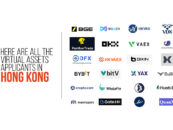
FinTech Association of Hong Kong Updates Guidance for Token Sales
by Company Announcement October 31, 2018Reflecting the rapid evolution of the digital asset industry and the growing regulatory scrutiny of the sector, the FinTech Association of Hong Kong (FTAHK) has issued an updated and revised version of its guidance on best practice in token sales.
Originally launched in December 2017, the refreshed and updated 35-page paper expands the scope of the original to include other token events, including airdrops and security tokens (or “STOs”), as well as to connect directly with the ground-breaking Code of Conduct produced by the Global Digital Finance industry body.
It also updates the sections covering governance standards and know-your-customer (KYC) controls. Practical guidance notes are included throughout to provide clear summaries for those considering undertaking a token sale.
Over USD 7 billion has been raised from ICOs so far in 2018, already well above the USD 6.2 billion raised in 2017. Despite some fundraising challenges in recent weeks, ICOs remain a popular medium used by the blockchain and crypto ecosystems. Updating the paper is part of the Association’s stated mission to advocate for the FinTech ecosystem and is intended to help further professionalise the digital asset industry, ensuring its long-term success.

Snapshot of some of the key factors for success.

Henri Arslanian
Henri Arslanian, Chairman of the FinTech Association of Hong Kong, said,
“The pace of change in the crypto space is so fast that it makes adopting specific regulations very difficult. This is why setting out best practices is the most effective way for the ecosystem to grow and become more institutional.”
Urszula McCormack, Co-Chair of the Policy & Advocacy Committee and one of the paper’s lead authors, said,
“Tokenisation unlocks, captures and transfers value in important ways for both traditional and new market infrastructures. It also empowers smart contract design. However, use cases, risks and opportunities are constantly evolving – which is why best practices need to be up-to-date and relevant.”
Featured image credit: Edited from ftahk.org








